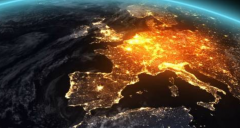And we should not forget -although not so relating to the spirit of this article- that the above mentioned "Italian bowels" received an extra boost and were most abundantly enriched by the Byzantine= Greek grammarians, poets, writers, musicians, astronomers, architects, artists, scribes, philosophers, scientists, politicians and theologians thrown out of Constantinople a.)due to the Vatican attacks and pillages of 1204 AD. and b). due to an invading Ottoman army= Khazarian Turks, on 29 May 1453.

Nor is there a link between the wealth of a country and its membership in large political groups at the global level. In addition to the regions already mentioned, many places combine smallness and wealth, as shown by Singapore, Taiwan, South Korea and New Zealand.
Coupled with the relative cultural unity forged by the Catholic Church, the feudal anarchy inaugurated by the Middle Ages liberated the economy and the spirit of enterprise. This specificity of the West explains what the British historian Eric Jones called "the miracle" or "the exceptionalism" of Europe. Unlike oriental and Asian tyrants capable of killing the creativity of an empire, European monarchs, by the smallness of their territories, knew some limits to their predation.
It was therefore easier for the industrious Western classes to escape oppression by punishing bad governments through emigration. Consider the revocation of the Edict of Nantes under Louis XIV and the impoverishment of the Kingdom of France induced by the exodus of Protestants to more favorable havens like Switzerland, the Netherlands, or England.
The absence of political unity allowed the continent to be ruled by many small, sovereign, and competing territorial divisions. From this competition was born a race for talent and capital, conducive to the diffusion of a certain political discipline. It was in these conditions that freedom, commerce, and science flourished.
That Macron invokes the "Renaissance" in his election campaign to sell membership in this new Empire, shows his historical misunderstanding.
The Renaissance itself was born from the bowels of an Italy divided into a multitude of city-states. It is this division that the Scottish philosopher David Hume considered favorable to the progress of the arts and sciences.
Also in Italy, Shakespeare, in the Merchant of Venice, leads Antonio to recall that the prosperity of the city depends on the securities and freedoms granted to all traders. From Benjamin Constant to Montesquieu to Alexis de Tocqueville, many thinkers were convinced that these freedoms are more likely to be safeguarded in small states than in vast empires.
From this point of view, the European Union is a cartel of governments eager to resuscitate imperial ambitions foreign to the conditions of the rise of our civilization. Its authoritarian projects of political, regulatory and fiscal standardization are betrayals of the spirit of innovation that requires the highest degree of decentralization and possible institutional competition.
Finally, it is the intellectuals Nathan Rosenberg and Luther Earle Birdzell who best summarize the historical factors behind the blossoming of the West. In a book published in 1986, they write that the prosperity of a civilization implies the expansion of an open trade on a politically fragmented territory. Applied to our region, this prescription leads us to prefer the dream of a Europe with a hundred thousand Liechtensteins to the dystopia of a continent-spanning empire.




